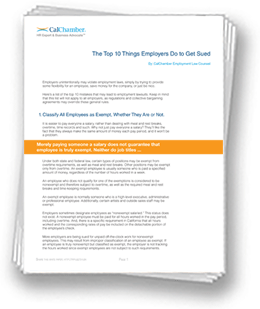California Termination Laws - Employee Termination
There are certain key activities to perform and forms to fill out before, during and after a termination of an employee takes place. In addition, there are several different types of termination scenarios, and different laws and guidelines that apply to each.
Common Mistake
- Failing to establish and follow logical, consistent policies for all types of employment termination situations.
Staying Out of Trouble
Claims for unlawful termination have increased in recent years. To protect yourself against potential claims, there are strategies you can put in place that help ensure that you are complying with all laws and avoid possible misunderstandings.
Avoiding Wrongful Termination Suits
No procedure guarantees you freedom from exposure to wrongful discharge liability or, even in the absence of liability, prevention of the filing of a wrongful discharge action by an employee.
Your best defense against such claims is an ongoing, proactive approach that includes well-articulated personnel policies and procedures that are consistent with California and federal labor law, and the fair and consistent application of those policies and procedures.
Avoiding Public Policy Violations
Wrongful discharge in violation of public policy means an employee was terminated for an unlawful reason in violation of an express California or federal government public policy.
Strategies for Protecting Yourself
Avoiding a wrongful termination lawsuit begins long before you actually terminate an employee. An error or miscommunication in any part of the employment process, from job applications to interviews to employee handbooks to performance reviews, can open you up to a wrongful termination lawsuit. You must take early action to protect yourself against legal action.
Terminating At-Will Employees
The law and the courts have placed significant limitations on your ability to terminate at-will employees. It is essential that all decisions to terminate such employees be based on legitimate, non-discriminatory business reasons.
Anti-discrimination
Both state and federal laws prohibit you from terminating employees based on certain characteristics, such as age and race. The fact is that everyone is protected in some way, so it is important to base your decisions to terminate on clearly defensible reasons.
Termination for Drug Use
Proceed very carefully when considering terminating an employee based on the positive result of a drug test. Although drug testing of employees is allowed in California, it can be justified only in very limited and strictly defined circumstances.
Whistleblower Protection
A significant number of both California and federal laws offer "whistleblower" protection for employees who report their employers to government agencies for alleged violations of state and/or federal law.
Protected Activities
There is an extensive list of activities that you cannot use as grounds for terminating an employee. Some involve employee privacy, some involve performing public service that requires that an employee be away from work, and others relate to private activities deemed worthy of protection by the legislature and/or the courts.
Layoffs and Plant Closings
The state and federal Worker Adjustment and Retraining Notification (WARN) Acts require you to issue notice a specific number of days in advance of a qualifying layoff or plant closing. Failure to do so can subject you to substantial penalties.
Exceptions to the WARN Notice Requirement
The law and the courts have set very narrow conditions under which an organization can be exempt from the Worker Adjustment and Retraining Notification (WARN) Act notice requirement.
Trigger Events
Any of four types of events can require you to comply with state and/or federal Worker Adjustment and Retraining Notification (WARN) Act provisions, thus requiring you to issue special notices to inform employees and others of your actions.
Affected Employees
The issue of whether an employee is affected by WARN Act provisions impacts whether you are required to send him or her a notice of plant closing. The courts have made a number of rulings that clarify which employees may or may not be "affected."
Related Resources
CalChamber members have access to several tools and services that help those who manage human resources to work through termination-related issues, including:
Exit Interview Form »
Use this form to gather an employee's comments at termination regarding his or her employment with your company.
Final Paycheck Worksheet »
Use this form to calculate the amount of an employee's final paycheck.
Termination Checklist »
Use this termination checklist when terminating an employee to ensure that you have completed all legally required forms.


